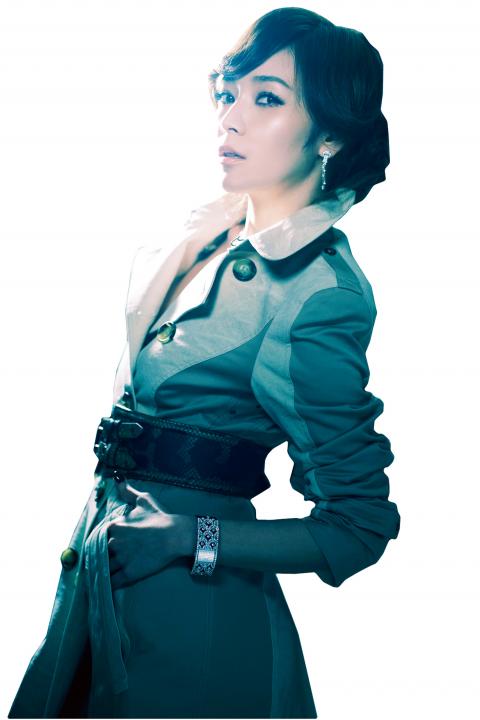It’s not even April, and 2011 is already shaping up to be a bumper year of celebrity nuptials. The Apple Daily reported that more than 20 celebrity couples will tie the knot this year, which the gossip rag has dubbed a “Hundred Years of Good Fortune” (百年好合) in a nod to the ROC’s 100th birthday.
Singer and actress Barbie Hsu (徐熙媛, aka Big S) and Chinese restaurateur Wang Xiaofei (汪小菲) will say their vows (for the second time) later this month, this time on Hainan Island; Patty Hou (侯佩岑) and Ken Huang (黃伯俊) will head to Bali next month to tie the knot; and singer Christine Fan (范瑋琪) will make an honest man of entertainer Charles Chen (陳建州, better known as Blackie) in May, and in the same month infamous cram school owner Kao Kuo-hua (高國華) and Chen Tsu-hsuan (陳子璇) will get hitched.
A Yahoo poll asked Netizens: “Whose wedding would you want to attend?” Even though they’ve yet to set a date, pop singer Selina Jen (任家萱) and fiance Richard Chang (張承中) came out top.

Photo: Taipei Times
Not to worry, there are plenty more fish in the celebrity sea, and a few mollusks too.
One star who might have difficulty finding a marriage partner is singer Show Luo (羅志祥, also known as Alan Luo).
“Whenever I’ve brought my girlfriend home in the past, my mom would intentionally let the dog out to go to the toilet,” he was quoted as saying in a report by the China Times. “Then, mom would watch to see if the girl would voluntarily help clean up after the dog. It was a test to see whether or not she loves animals.”
If cleaning up animal droppings is a sign of love, it might be a while yet before Luo gets hitched.
Then again, a love of animals doesn’t necessarily equate to loyalty in a relationship. The one ex who “passed” Luo’s mother’s test was later caught cheating on him.
In other romance news, Jolin Tsai’s (蔡依林) relationship with Vivian Dawson seems to be cooling off amid rumors that the New Zealand hunk is an inconsiderate creep. At a promotional event earlier this week, Dawson remained tight-lipped when asked about his relationship with Taiwan’s queen of pop.
What would he give his love on Valentine’s Day, asked the assembled gossip hounds? He lamely responded that the present would be the beauty products he was plugging. His manager later told the media that the pair were just friends.
If Dawson’s romance is on the rocks, he can at least take comfort in his earning power, which has gone from NT$10,000 per appearance to NT$100,000. But will a breakup mean a smaller paycheck? Stay tuned.
Meanwhile, NOWnews revealed that manly singers Jam Hsiao (蕭敬騰) and JJ Lin (林俊傑) are an item after they were spotted having dinner together. This followed a series of flirtatious posts on their microblogs.
“I want to eat JJ,” (我要去吃JJ了) Hsiao wrote.
One “shocked” fan wrote: “He came out.”
Lin, who the Liberty Times (the Taipei Times’ sister newspaper) reports is a devout Christian, wrote that if Hsiao was hungry, “I’d better put some more sauce on me. Otherwise he’ll only be able to taste my sweat.”
Yum-yum.

That US assistance was a model for Taiwan’s spectacular development success was early recognized by policymakers and analysts. In a report to the US Congress for the fiscal year 1962, former President John F. Kennedy noted Taiwan’s “rapid economic growth,” was “producing a substantial net gain in living.” Kennedy had a stake in Taiwan’s achievements and the US’ official development assistance (ODA) in general: In September 1961, his entreaty to make the 1960s a “decade of development,” and an accompanying proposal for dedicated legislation to this end, had been formalized by congressional passage of the Foreign Assistance Act. Two

Despite the intense sunshine, we were hardly breaking a sweat as we cruised along the flat, dedicated bike lane, well protected from the heat by a canopy of trees. The electric assist on the bikes likely made a difference, too. Far removed from the bustle and noise of the Taichung traffic, we admired the serene rural scenery, making our way over rivers, alongside rice paddies and through pear orchards. Our route for the day covered two bike paths that connect in Fengyuan District (豐原) and are best done together. The Hou-Feng Bike Path (后豐鐵馬道) runs southward from Houli District (后里) while the

March 31 to April 6 On May 13, 1950, National Taiwan University Hospital otolaryngologist Su You-peng (蘇友鵬) was summoned to the director’s office. He thought someone had complained about him practicing the violin at night, but when he entered the room, he knew something was terribly wrong. He saw several burly men who appeared to be government secret agents, and three other resident doctors: internist Hsu Chiang (許強), dermatologist Hu Pao-chen (胡寶珍) and ophthalmologist Hu Hsin-lin (胡鑫麟). They were handcuffed, herded onto two jeeps and taken to the Secrecy Bureau (保密局) for questioning. Su was still in his doctor’s robes at

Mirror mirror on the wall, what’s the fairest Disney live-action remake of them all? Wait, mirror. Hold on a second. Maybe choosing from the likes of Alice in Wonderland (2010), Mulan (2020) and The Lion King (2019) isn’t such a good idea. Mirror, on second thought, what’s on Netflix? Even the most devoted fans would have to acknowledge that these have not been the most illustrious illustrations of Disney magic. At their best (Pete’s Dragon? Cinderella?) they breathe life into old classics that could use a little updating. At their worst, well, blue Will Smith. Given the rapacious rate of remakes in modern